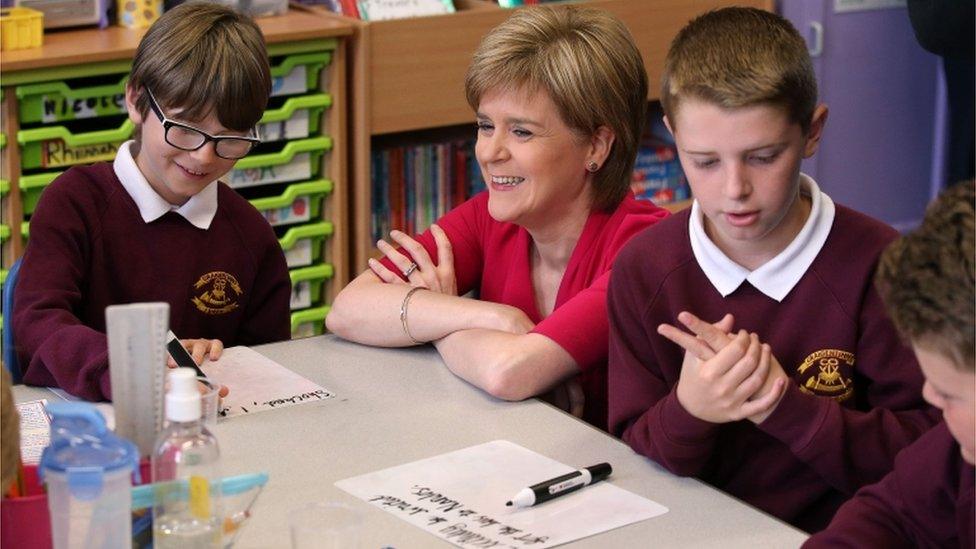Nicola Sturgeon details standardised school testing plans
- Published
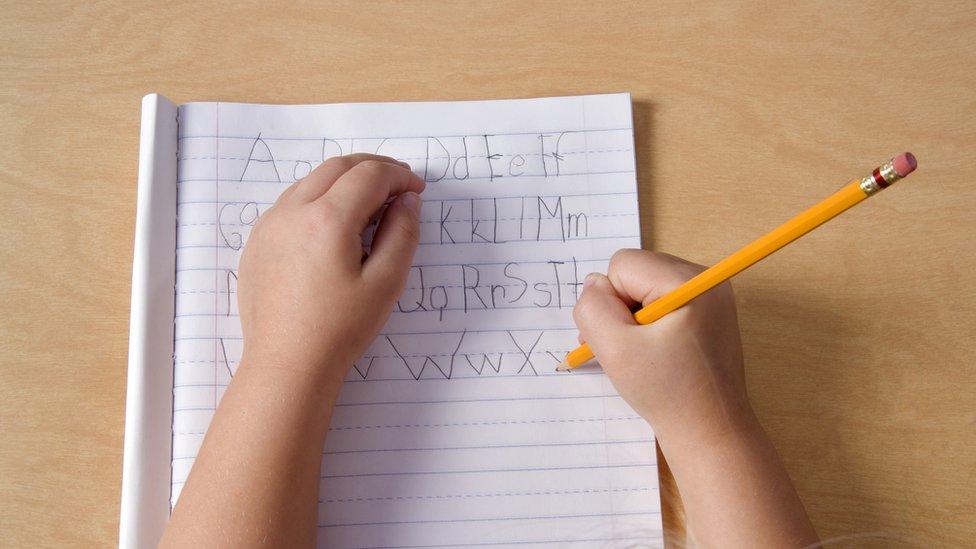
Pupils will be assessed in reading, writing and numeracy in P1, P4, P7 and S3
More details of plans to introduce standardised testing in Scotland's primary schools have been revealed.
Local authorities will be required to use new standardised assessments, in reading, writing and numeracy, in P1, P4, P7 and S3.
First Minister Nicola Sturgeon said the raw data would not be made public.
However, information would be published on the proportion of children reaching the expected standards in numeracy and literacy.
Some critics have raised concerns that the results could be used to draw up "league tables" for primary schools.
Teachers' unions, including the Educational Institute of Scotland, have been concerned about the possible unintended consequences of the assessments if the test results were used to produce unofficial league tables.
The tests are a central plank of the National Improvement Framework which the Scottish government claimed would help narrow the attainment gap between the least and most deprived children.
Ms Sturgeon formally launched the framework at an event in Glasgow, saying it offered Scotland the opportunity to become a world leader in education.
She said: "Despite the progress we are making, nobody can be comfortable living in a country where different levels of wealth create such a significant gap in the attainment levels - and therefore the life chances - of so many children.
"That's why the Scottish government is taking concerted action now. Our overall aim is to raise standards everywhere, but to raise them most quickly, in the areas that most need it."
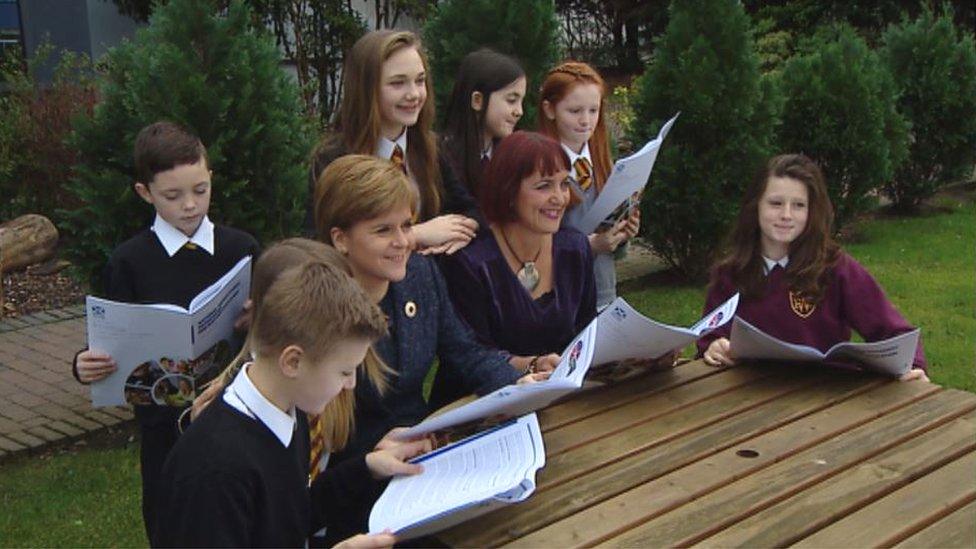
First Minister Nicola Sturgeon and Education Secretary Angela Constance launched the framework in Glasgow
In response to the plan, Larry Flanagan of the EIS said: "The EIS has been working constructively with Scottish government to ensure that the introduction of a national improvement framework did not herald a return to the damaging 'teach to the test', target setting, league table agenda which CfE has steered Scottish education away from.
"We're hopeful that the FM's announcement later today will confirm the central role of teacher professional judgement in assessing pupil progress and the continuation of the CfE assessment framework, where the primary purpose of assessment is to support learning."
SSTA General Secretary Seamus Searson said: "The standardised assessment can only be a small part of any assessment as it can only confirm a relatively small part of a teachers professional judgement.
"The teacher is working with a young person for a considerable amount of time and would be able to give a reasonably accurate assessment of the level of literacy and numeracy.
"Any computerised test would only be an indicator and could not overturn that judgement."
Worries over anxiety
Labour's Iain Gray said he believed there was "rather less" to the plan than "meets the eye".
He added: "It avoids high stake national testing which is good, but then it avoids the new standardised testing altogether as the timetable for that has slipped off into next year at least.
"The data on Curriculum for Excellence levels is data we already have.
"The truth is we will only close the attainment gap with adequate resources properly targeted."
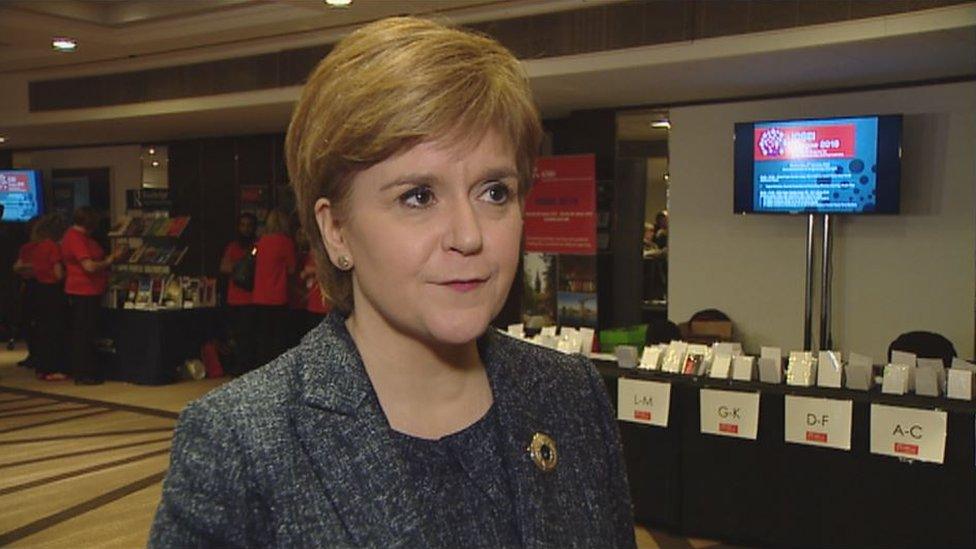
First Minister Nicola Sturgeon said she wanted to raise standards everywhere
The Conservative's Liz Smith said she was pleased with the introduction of "better testing".
The MSP added: "The Scottish Conservatives have long called for a structure of standardised school tests which provide a more consistent approach across Scotland and which help both schools and local authorities to understand which educational practices best raise overall attainment.
"It is not about more testing or about testing for the sake of it. Rather, it is about ensuring that there is better quality testing at key stages in a pupil's school career."
The Scottish Green Party said it was worried that the new tests would "cause anxiety for pupils and staff".
Spokeswoman Isla O'Reilly added: "Allowing teachers the time to get to know pupils and their circumstances would be more effective at closing the attainment gap than introducing tests."
Leader of the Scottish Lib Dems, Willie Rennie, believed national testing would "undermine the work of teachers and the ambitions of Curriculum for Excellence".
He said: "These national tests will lead to league tables, high stakes testing and teaching to the test - they will undermine efforts to increase attainment in Scottish schools."
Local councils
While most of Scotland's 32 local authorities already conduct some form of standardised assessment to monitor children's progress, the first minister argued that they were not conducted on a consistent basis.
Pilots will be conducted in some areas this year, with the assessments introduced across Scotland in 2017.
Information on the percentage of children achieving curriculum levels in literacy and numeracy will be published nationally and by school and local authority.
The Scottish government said the data would be used to set specific milestones for closing the gap in attainment between children from the least and most deprived communities.
Parents will also be able to access information about their own child's progress to know if further support may be required at home and in school.
Other measures which have also been announced, include;
A £100m Attainment Scotland Fund, which provides targeted support to over 300 schools and their local authorities in the most deprived areas
Introducing attainment advisors to work with local authorities and schools
The "Raising Attainment for All" programme which has encouraged more than 200 schools across the country to try out and share new ideas
A Scottish College for Educational Leadership, encouraging more classroom teachers to take masters qualifications
A new qualification for headship - mandatory for new head teachers from the summer of 2019 onwards
Earlier this week, the Scottish Parent Teacher Council (SPTC) published the findings of a survey of parents' views on the new assessments.
It suggested mixed opinions with many uncertain and concerned about how the information on pupils' progress, gathered through the new tests, might be used.
Last month, a major report by the Commission on School Reform warned the introduction of the new assessments would have to be handled "carefully".
- Published5 January 2016
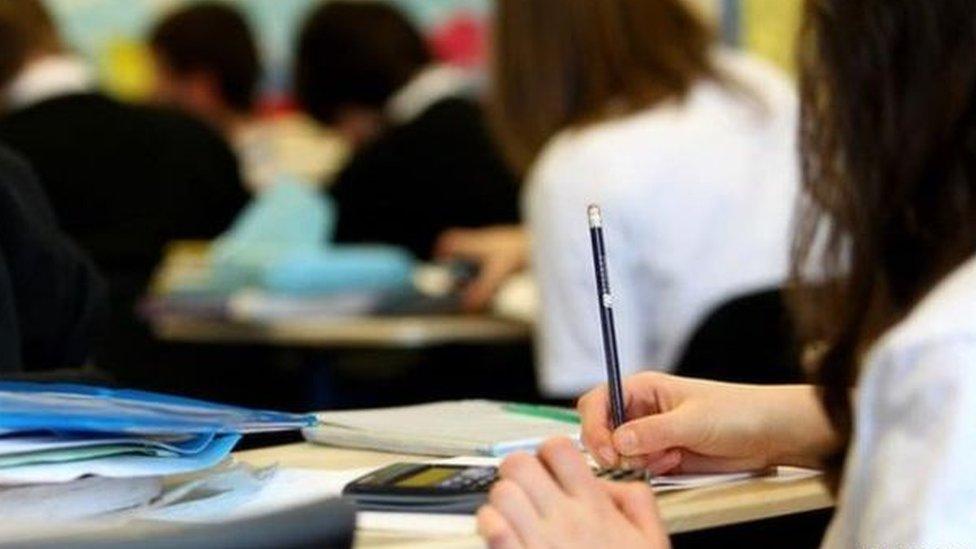
- Published8 December 2015

- Published1 September 2015
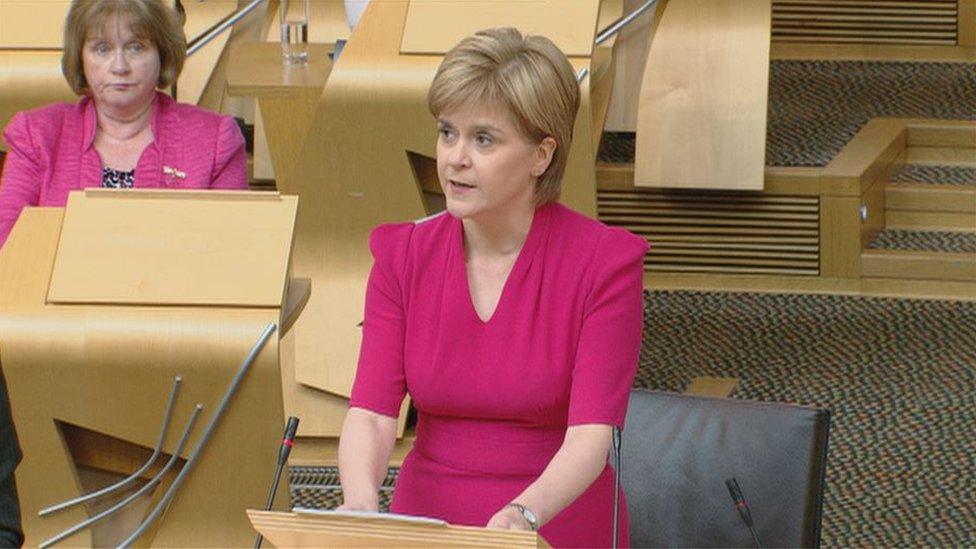
- Published2 September 2015
